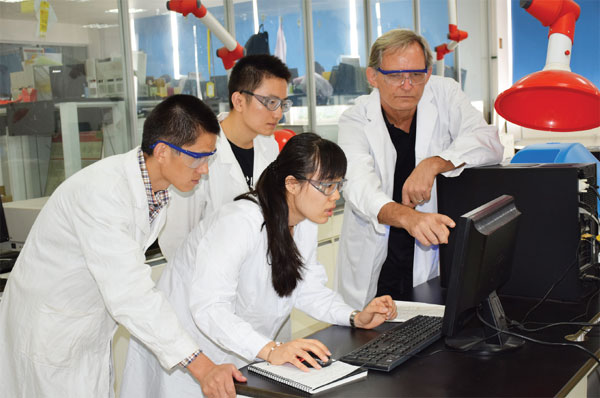Big data could aid research into TCM
Technology can offer a better understanding of the complexities of traditional preparations and how they work
When the human genome was first decoded in the year 2000, scientists expected rapid progress in figuring out how genes affect human characteristics and disease. But that has taken longer than anticipated.
The problem is that most diseases are caused by the interactions of a large number of genes, not just by one or two individual genes.
Classical statistical analysis is used to find correlations between just a few factors. Additionally, it requires researchers to build models based on prior views of what is important.
But big data sets and the techniques used to analyze them are able to find much more complicated patterns that might not have been thought of by the researchers. So since big data has become available, scientists have made much more rapid progress in genomic analysis.
Jay Siegel, dean of the Health Science Platform at Tianjin University, points out that traditional Chinese medicine also depends on complex inputs and, therefore, can benefit from big data analysis.
"TCM looks at the whole system, as opposed to Western medicine, which is more reductionist and focuses on one or a few effective elements," he says. "One of the problems when you have small data sets and when you use classical statistics is that you need a model that is relatively elementary in order to get statistically significant results. But when you have huge amounts of data and you can process this in a much more sophisticated way, you can start looking at analysis of entire complex systems.
"I think modern big data analysis is going to lead to a much better understanding of where and when and why some TCM preparations are effective and others are not. I think that is going to lead us to a new understanding of this balanced health where you can take advantage of nutrition and your daily behavior, but you can also take advantage of things that don't have to be reduced down to a single element," he says.
"In TCM, there are these very complex ways of preparing groups of herbs, called pao zhi. You can't really easily say that one component in a plant is the active ingredient."
"Western medicine tries to pull out one molecule. Maybe mix it with another molecule to discover new therapies. In TCM, there are mixed quantities of these herbs, changes in the way you prepare them, changes in the season you collect them. So you have a very complex system which is not going to lend itself to just being simplified into one pure substance. TCM is a synergistic, complex system and we need to find ways to study that."
"Big data is going to help. Having more data is going to allow us to analyze a more complex model, and that more complex model is going to give us a better understanding of how and why these things work," he says.
|
Jay Siegel (right), dean of the Health Science Platform at Tianjin University, instructs his students at the university. He says he aims to help the students find a balance between developing skills and creative thinking. Provided to China Daily |

























